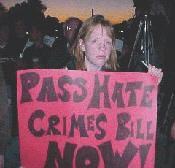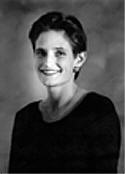 |


Support Nondiscrimination Laws Conducted by Harris Interactive for Gill Operating Foundation Attitudes are Influenced by Familiarity with Gays & Lesbians |
|
Compiled By GayToday
In addition, today 57% of likely U.S. voters surveyed favor laws to make it illegal to discriminate against lesbians and gays--a marked improvement in less than a year. When asked the identical question in January 2000, in a comparable U.S. voter sample, 52% looked favorably upon nondiscrimination legislation, while 27% opposed. These were key outcomes of a new online survey conducted by Harris Interactive of 2,001 likely U.S., weighted voters between October 25 and 26, 2000 on behalf of the Gill Operating Foundation. Harris Interactive is a leading global market research firm, best known for the Harris Poll. According to Katherine Pease, executive director of the Gill Operating Foundation, "The signals are inescapable that lesbians and gays have remarkable circles of influence with family, friends, and co-workers. We consistently see evidence of that progress, and these research findings help track that influence in positive ways." Pease observed that the latest data begins to actually track voter attitudes, moving from "familiarity" to "awareness" and eventually to growing "support" on LGBT issues. Tracking Familiarity
Tracking Awareness When these same non-gay, yet gay-familiar voters were asked if they were "more or less aware" of gay and lesbian issues because of their relationship with a gay, lesbian or bisexual, 37% stated they were "more aware," while only 2% said they were less aware, and 61% said that it had "no effect" on awareness. Tracking Support The national sample of 2,001 voters then was asked their support on specific issues important to gays and lesbians. When voters were queried whether they support specific policy measures favorable to gays, the breakdowns are as follow: [Note that respondents who disclose knowing someone gay, lesbian or bisexual are labeled as "familiar respondents," while those who report no familiarity with a gay, lesbian or bisexual are simply categorized as "non-familiar respondents." The data organized below represent the percentages of survey participants who selected either "somewhat support" to "strongly support" in their responses.]

Finally, the survey found 37% of voters declared they were "more aware" of gay issues through knowing someone who is gay, lesbian or bisexual. This group was asked a follow-up question whether they are more or less likely to vote for a candidate who supports specific issues important to gays and lesbians. Here are those findings:
The Harris Interactive research was conducted in collaboration with OutVote2000, a nonpartisan project of the Denver-based Gill Operating Foundation that provides training and technical assistance and helps build the capacity of LGBT nonprofits nationwide. A major component of the OutVote2000 campaign is the new website, www.outvote2000.org, a central resource for LGBT voters to learn about issues, candidates, absentee or early voting rules, polling locations and times, and most importantly to send e-postcards to encourage others to vote and to set email reminders for themselves and their friends to vote. The Gill Operating Foundation will publish the full results of this survey, and other research commissioned as part of the project, in December 2000. The goal of the research is to analyze the 2000 election cycle and to gather important knowledge about how lesbian, gay, bisexual and transgender issues affect voters for future use by organizations planning education and outreach to LGBT voters. The Gill Operating Foundation operates technical assistance and training programs for LGBT non-profits nationwide, and provides resources to people learning about philanthropy all through its OutGiving Department. OutVote2000 is a nonpartisan project to motivate gay voters and provide research into understanding LGBT and allied voters. The Gill Operating Foundation is affiliated with the Gill Foundation. Started by Tim Gill in 1994, the Gill Foundation and the Gill Operating Foundation focus on LGBT issues, having given more the $19 million dollars and providing thousands of hours of technical assistance since it was started. Methodology This Harris Interactive QuickQuerySM survey was conducted via the Harris Poll Online, within the United States, from October 25-26, 2000. The poll was conducted among 2,318 respondents, 18+ years of age. Figures for age within gender, race, education, region, and income were weighted Where necessary to bring them in line with their actual proportions in the population. QuickQuery is an omnibus service that provides approximately 2,000 respondents in two days. In theory, with a sample of this size and after weighting the data, the surveyors say they have a 95 percent certainty that the results have a statistical precision of plus or minus 2 percentage points of what they would be if the entire adult population of the United States had been polled with complete accuracy. There are several other possible sources of error in all polls or surveys that are probably more serious than theoretical calculations of sampling error. They include question wording and question order, non-response, and screening. It is difficult or impossible to quantify the errors that may result from these factors. |


